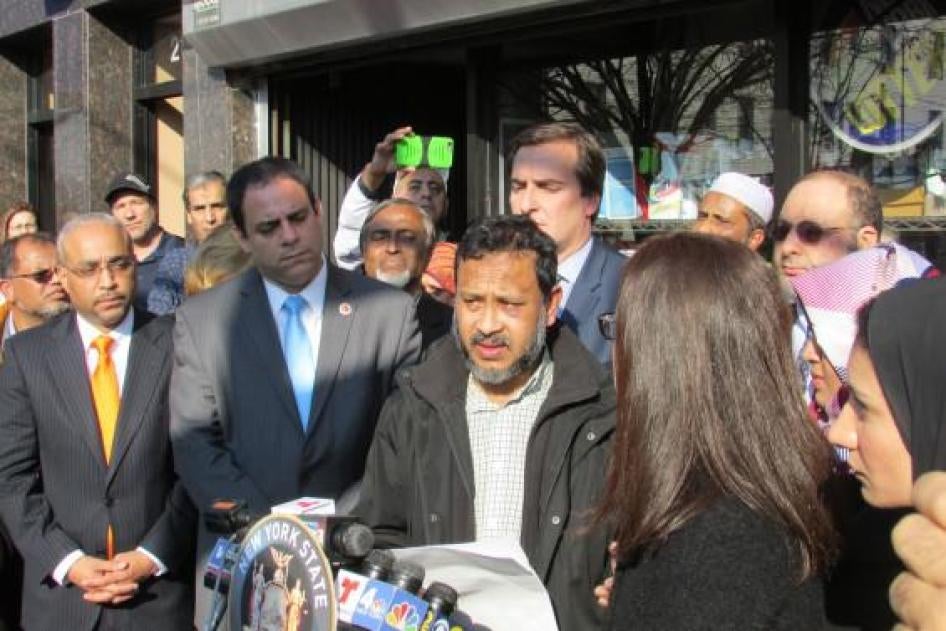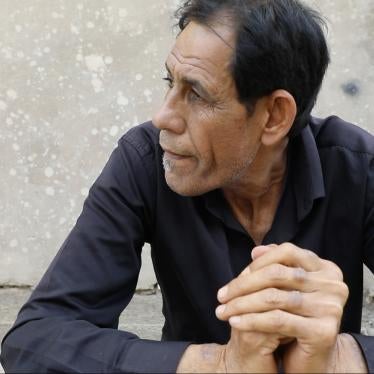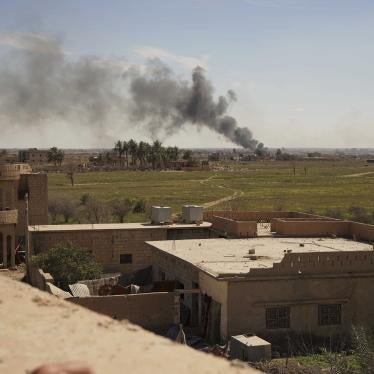“Nothing like this has ever happened to me before,” said Sarker Haque, his face still black and blue from the beating. “I’ve lived here all these years and never, in this community? Never have I ever experienced anything like this.”
Haque, originally from Bangladesh, has owned the Fatima grocery store in Astoria, Queens, one of the most diverse neighborhoods in the United States, for 16 years. Last week media reported a man came into his shop and started attacking him, striking his head and face while shouting “I kill Muslims.” Haque was badly injured and needed treatment in a hospital. Police are investigating the incident as a hate crime.
This weekend, I joined a group of residents who went to Haque’s store armed with flowers and sympathy cards. We added ours to the existing pile and were among many neighbors and community leaders who turned out to support Haque and condemn the violence against him. The attack and events thereafter demonstrated some of the best and worst of American society. A seemingly racially motivated crime, met with an outpouring of support against such violence from the community.
Unfortunately, the attack on Haque is not an isolated incident but an example of an increased number of attacks against Muslims and mosques – particularly since organized assailants aligned with the Islamic State killed 130 people in Paris and a couple reportedly pledging allegiance to the extremist group killed 14 people and injured 21 more in San Bernardino, California. The attacks include throwing a pig’s head at the door of an Islamic center in Philadelphia, and the shooting of a Muslim cab driver in Pittsburgh by his passenger after asking about his background.
These attacks come at a time of heightened rhetoric against Muslims and discriminatory policy proposals by US presidential candidates and politicians. Donald Trump recently called for a ban on all Muslims from entering the United States and developing a system to register and track Muslims. Ted Cruz and Jeb Bush have proposed preferential treatment for Christian refugees from Syria. And 30 US governors have publicly opposed the resettlement of Syrian and Iraqi refugees accepted by the US government in their states.
These proposals ignore important lessons learned in the wake of the September 11, 2001 attacks: policies and practices that embrace communities most vulnerable to backlash, not tar them, should be essential elements of US counterterrorism strategy. Targeting whole communities for surveillance, or discriminating against them based on religion, erodes trust and undermines efforts to root out violence.
“Our nation should be mindful that there are thousands of Arab-Americans who live in New York City, who love their flag just as much as [I] do," said President George W. Bush the day after the 9/11 attacks. “As we seek to win the war … we [must] treat Arab-Americans and Muslims with the respect they deserve."
President Barack Obama and other US officials expressed similar sentiments since the most recent attacks. “We cannot turn against one another by letting this fight be defined as a war between America and Islam,” Obama said during a speech following the San Bernardino attacks. “If we’re to succeed in defeating terrorism we must enlist Muslim communities as some of our strongest allies, rather than push them away through suspicion and hate.”
These were important reminders, but actions speak louder than words. President Bush’s appeal to principle on September 12, 2001 was not always followed by equally enlightened policy. Abuses against Muslims, primarily non-US nationals, in the United States after 9/11 included interrogations without access to counsel, prolonged detention without charge under material witness law, dubious arrests followed by unnecessarily restrictive forms of confinement, and physical and verbal abuse of people because of their religion or national origin. This was followed in subsequent years by excessive government secrecy, overly broad use of material support charges, and use of harsh and abusive conditions of confinement in often questionable terrorism cases.
The US should not repeat the same mistakes. It should also take steps to stem backlash violence against Muslim communities. Our research shows that when government officials and police reach out to communities particularly vulnerable to backlash attacks and develop plans ahead of any violence, this can help mitigate harm. Public condemnation of hate crimes by officials has also made such communities feel more secure. Our research also shows that discriminatory law enforcement practices that target whole groups of people based on religion, rather than actual suspicion of criminal activity, alienate the very communities the government relies on most to report possible terrorist threats.
Recent attacks in Paris and San Bernardino have understandably generated new levels of fear. Those responsible targeted people going about their daily lives – going to concerts and attending holiday parties. But that of course was precisely the aim – to disrupt any sense of safety and normalcy and sow anxiety in the population. The response to such attacks, both by US leaders and those who seek a leadership role, should be one that embraces the lessons of 9/11, not discards them.









